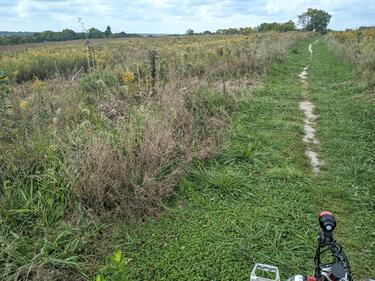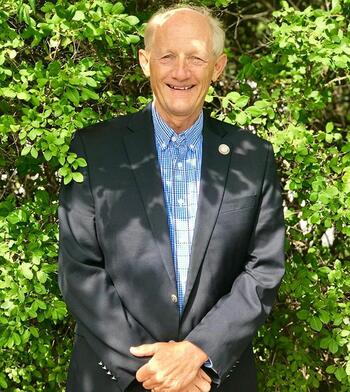Missouri Department of Conservation greatly expands allowed use of bicycles and electric bicycles in hundreds of Missouri Conservation Areas
Earlier this year, the Missouri Department of Conservation proposed greatly increased bicycle access to hundreds of Conservation Areas across Missouri. Immediately bicyclists and groups across Missouri proposed increasing access for electric bicycles as well. MoBikeFed organized a write-in campaign to MDC, and within a few weeks MDC withdrew the proposed regulation for reconsideration.

MoBikeFed was able to stay in communication with MDC staff throughout this process, ensuring that the voice of Missouri bicyclists was heard. MDC was very responsive to the concerns and issues we and other user groups raised. In the end, access to (most) MDC service roads will be allowed for both bicycles and all three classes of e-bikes.
Helping move the process forward is current MDC Commission Chair Mark Mc1Henry - former Kansas City Parks and Rec Director and an avid cyclist who has participated in many rides organized by MoBikeFed and other bicycling organizations across Missouri.
The Missouri Department of Conservation announcement is below:
The Missouri Conservation Commission gave final approval at its Dec. 10 open meeting to the Missouri Department of Conservation’s (MDC) proposed regulation changes that would allow the expanded use of bicycles and electric bicycles on many department-area service roads and multi-use trails. The Commission also gave final approval to MDC definitions of bicycles and electric bicycles. The changes will become effective Feb. 28, 2022.
The final approval of these regulations follows the initial approval by the Commission in August and a review of public comments received during October.
According to MDC, conservation-area users have expressed interest in expanding the use of bicycles and electric bicycles to include conservation-area service roads and multi-use trails for greater access to the areas. Bicycle use on MDC’s approximately 1,100 conservation areas is currently restricted to roads open to public-vehicle traffic and some multi-use trails. Bicycle use is currently not allowed on conservation-area service roads.
Service roads are non-public roads on MDC areas used by staff to conduct resource management activities. They are marked on online maps on the MDC website at mdc.mo.gov/discover-nature/places. Many service roads are currently used as walking paths by the public. MDC notes that conditions of service roads on department areas vary and are not maintained at the level of public-use trails and public roads.
MDC Commission Chair Mark McHenry is an avid cyclistMost MDC conservation areas do not have applicable service roads or multi-use trails. The regulation change will impact approximately 300 MDC areas by allowing bicycle and electric bicycle use on service roads and/or multi-use trails. Approximately 30 of these areas will be closed to bicycle and electric bicycle use during all portions of the firearms deer hunting season and the spring turkey hunting seasons.
Exceptions would also include service roads used by staff at fish hatcheries and other heavily used MDC areas or where bicycle use could cause damage to sensitive habitats, such as designated natural areas.
Electric bicycles are defined by MDC as “any two-wheeled or three-wheeled device equipped with fully operable pedals, a saddle or seat for the rider, and an electric motor of not more than 750 watts, and which meets one of the following three classes:
- Class 1 electric bicycles are equipped with a motor that provides assistance only when the rider is pedaling, and that ceases to provide assistance when the bicycle reaches a speed of 20 miles per hour;
- Class 2 electric bicycles are equipped with a motor that may be used exclusively to propel the bicycle, and that is not capable of providing assistance when the bicycle reaches the speed of 20 miles per hour;
- Class 3 electric bicycles are equipped with a motor that provides assistance only when the rider is pedaling, and that ceases to provide assistance when the bicycle reaches the speed of 28 miles per hour.”
Bicyclists are expected to follow appropriate trail etiquette including yielding to pedestrians and horseback riders, maintaining a safe speed, staying on designated trails or service roads, and avoiding damaging trails by not riding in wet conditions.
Find MDC conservation areas and other MDC Places to Go online at mdc.mo.gov/discover-nature/places.
Next up: We'd like MDC to consider allowing expanded access to short-term dispersed camping for people traveling by foot and bicycle. In many parts of Missouri, Conservation Areas are logical public lands to allowed low-impact overnight dispersed camping by touring bicyclist and bikepackers. Right now, the vast majority of Conservation Areas disallow all types of camping.
Reminder about related Missouri state agency bicycle, ebike, and disabilities access policies:
- Missouri State Parks allows ebikes on bicycle trails and assisted-mobility devices on walking trails
- Missouri State Parks campgrounds have a no-turn-away policy for small groups who arrive by bicycle or on foot. This has long been a unpublished policy, but in 2020 thanks to a request by a MoBikeFed member, State Parks has now publicly published the policy so that those needing to use the policy and easily refer to it. Details here.
Working to improve access for people who bicycle, walk, and hike is one way MoBikeFed helps fulfill our Vision for Bicycling and Walking Missouri.
Your membership and generous financial support helps turn our Vision into reality.
Join MoBikeFed's Advocacy Network
Working together we make a real difference! Join our advocacy network:
Related pages
Current topics...
Archives...
- Home
- JOIN/DONATE
- News/Info
- Missouri Bicycling, Running, Trails
- Bicycle Skills and Safety
- Missouri Bike/Ped Law
- Clubs and Organizations
- Bike Shops
- Running Shops
- Bicycling, Running, Trails-related Businesses
- Ride, Run, Walk, Hike, Triathlon, and Events Calendars
- Bicycles on Amtrak
- Maps and Routes
- Trails and Trail Maps
- IBikeMO.org
- Planning a Missouri bicycle trip
- Gravel and Bikepacking Maps & Routes
- Bicycle & Touring Routes
- Advocacy
- Campaigns
- Our Legislative Platform
- Complete Streets
- Statewide Rock Island Trail
- Statewide Trail Vision - Quad State Trail
- Bicycle Friendly Missouri
- Walk Friendly Missouri
- Safe Routes to School
- MoDOT funding crisis
- High Priority Bike/Ped Project List
- Anti-harassment laws in cities & statewide
- Updating the basic bicycle law
- Our Vision for MoDOT
- Our Vision for MPOs/RPCs
- Our Vision for Cities & Counties
- Bicycle, pedestrian, trails plans across MO
- Protecting Vulnerable Road Users
- Vision Zero
- Missouri Trail Towns
- Store
- About


